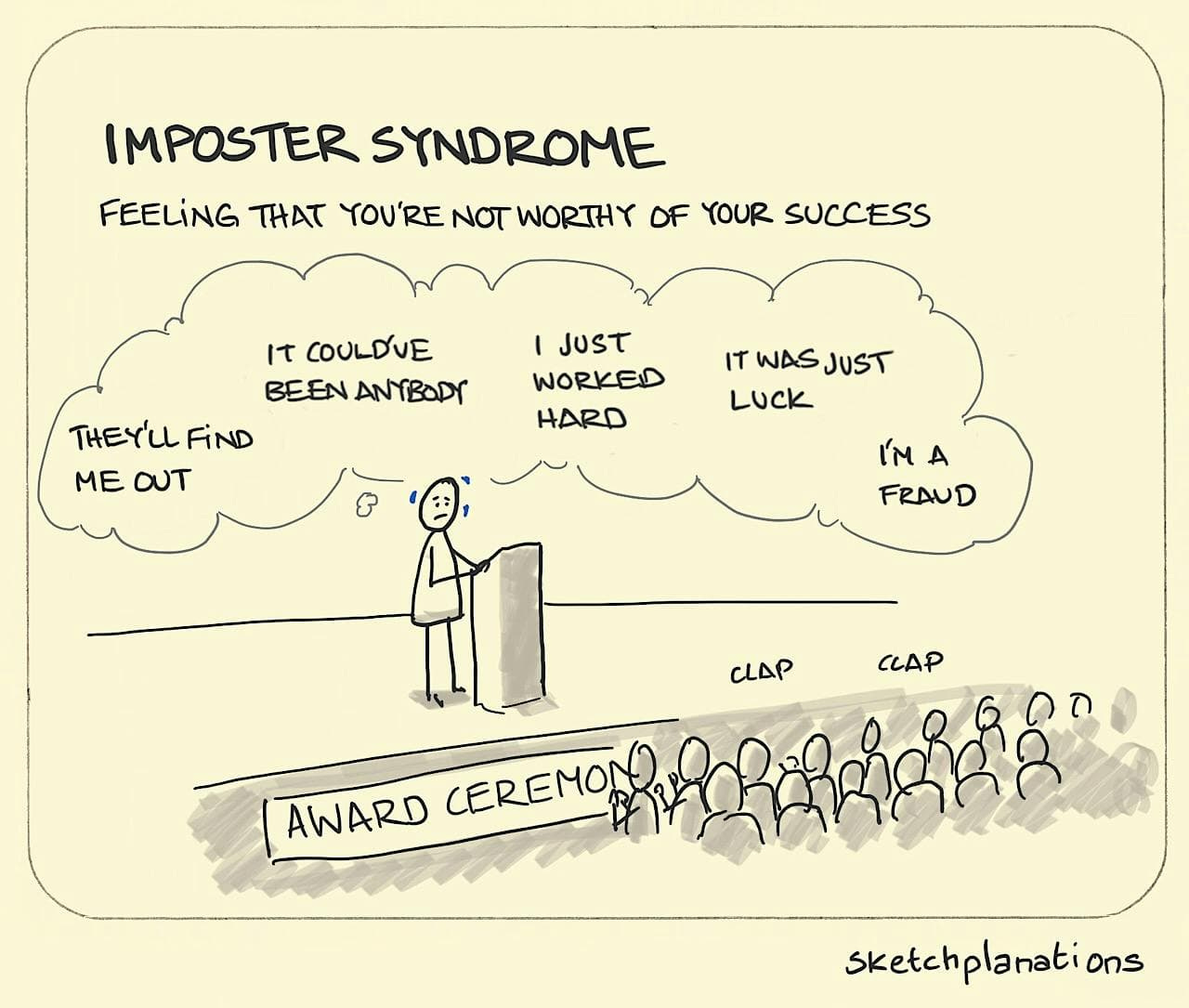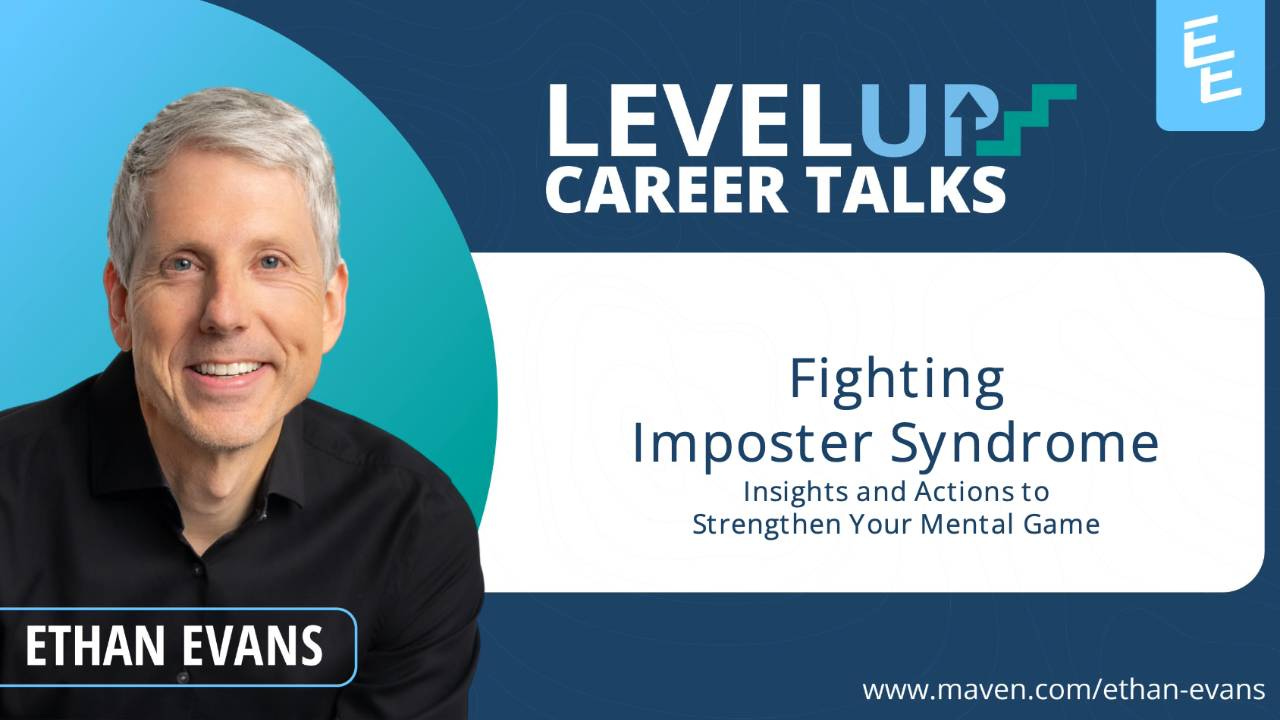Overcome Imposter Syndrome
4 actions to fight imposter syndrome and the feeling of "fake it until I make it"
Ethan & Jason here—welcome to this week’s *free article* of Level Up: Your source for executive insights, high performance habits, and specific career growth actions.
Three FYIs:
Watch Ethan’s new interview with Ani Filipova. How Amazon’s Leadership Principles Created a $15B Culture of Innovation. Watch here.
(Event) Maven Lightning Lesson. Ethan and David Markley (VP of Technology) share what it takes to deliver against a hard deadline. RSVP here.
(Event) Level Up Workshop: Get the most out of GenAI for non-tech people. Simple actionable ways to instantly apply AI to your work. Members, RSVP here.
I was lucky enough to have my team grow from 6 to 800 people in 9 years. I was promoted from Senior Manager to Director to Vice President, and I had imposter syndrome the whole time.
It is no surprise that when my team grew 130x from 6 to 800, I ended up not fully knowing what I was doing. At the same time, it is hard to say no to opportunities when you have experienced downsizing and setbacks.
So, as the chance to take on new tasks and challenges was available, I said yes.
There was definitely an element of "fake it until I make it" in the whole process.
It is also true that most of the leaders above and below me were in the same situation.
Because of the unprecedented growth of Amazon through these years, most of my managers and direct reports were also in the largest and most complex jobs of their lives.
While I cannot know the inner workings of their minds for sure, I feel confident that many of them had similar feelings of imposter syndrome.
Here are 4 ways I fought it, and how you can too:
Action 1: If you worry that you are in over your head, or that people might find out you don't completely know what you are doing, realize that this is normal.
Action 2: Understand that it is normal to be in the largest and most complex job of your life for much of your career. If you are not, it often means you have either stepped back intentionally or that you have suffered a setback (like a layoff). Growth inevitably means doing harder things than ever before.
Action 3: Get help. Be open with your mentors on what you need. You do not have to share all your worries to lay out your challenges and ask for advice. If you are in an environment where admitting “development areas” is unacceptable, turn your language around and ask for "help optimizing performance and delivery." No one will be against optimization, and it amounts to the same thing - getting insight on any gaps and places to improve.
Action 4: Hire a coach, therapist, or counselor if you need one. To be top performers, we need a strong mental game. As leaders, particularly of knowledge work, our whole performance comes from our minds. None of us would hesitate to go to a doctor if we were sick, or a trainer to develop our bodies, so getting help with our mental performance should be a no-brainer.
However, there is hesitation and sometimes shame in getting help with our mental game.
If you want to go deeper, get my 65-minute Career Talk on ‘Fighting Imposter Syndrome - Insights & Actions to Strengthen Your Mental Game’ where I share my personal experience, how to normalize your experience, how to embrace growth and complexity, how to seek support and mentorship, and I answered pre-submitted and live questions from our Level Up Community.
Here’s a 3-minute trailer of the talk.
While Career Talks classes are available individually for purchase ($59 each)—all are free to paid newsletter subscribers ($354+ value).
One paid subscriber wrote: “I’ve been a member since it started. The return on investment is off the charts.”
Readers — What mental challenges are you fighting?
If you have overcome typical worries either in a specific job or long term, share what you did please.

Audience Insights
Additional advice and stories shared from readers:
“One thing that has helped me - and probably fits best with my natural personality - is to realize and embrace the power of really good questions. I think many managers and leaders feel they need to have all the answers but as teams scale or you are leading functions/experts you didn’t grow up in, I’m always reminded how asking useful questions can rally resources to solutions beyond what your individual brain can create, as well as create a climate of learning & improvement that helps everyone.”
“Being a leader in a large and complex job can be lonely. There’s a lot of things you can’t say to your team, and things that can be hard to admit to your boss, so finding someone to commiserate with who understands is helpful. A coach can help with this, but what I’m really talking about is finding someone else who is going through what you are. There’s also an element of figuring out how vulnerable you can be with others around you without undermining your ability to lead. It feels like a delicate balance.”
“When I was promoted to Vice President at Starbucks, my imposter syndrome was exacerbated by the fact that I was now leading a technical function where I had no subject matter expertise and my predecessor was fired. I hired a coach and also added journaling to my routine as it helped me reflect on what I brought to the table. In my book, From Barista to Boardroom, I write about those initial insecurities and how I learned to just be myself and get comfortable with the discomfort.”
“Well, I have been feeling it this fiscal year because I’ve gone back to being the only one in my org (Female, not “American”). And a few things have already happened which haven’t inspired confidence. So, here’s what I’m doing to counter that: I’m holding virtual coffees with some of our partners who are like me, and staying in touch with those who are like me at work but are one level below so I can bring them with me. I can’t change the rest of it.”
“I suffered miserably from imposter syndrome when I joined Google back in 2011. In fact it was so bad, it led to my first depressive diagnosis. What helped was coaching, counseling, psychiatric meds, and time. I worked with a career coach who helped to align reality (much better) than my perception (much worse). And counseling included from my wife (general internist), mom (licensed social worker) and friend (psychiatrist).”
“I’ve never been in a position so senior but as a degree-less Amazon leader who started as a seasonal L2, imposter syndrome has been part of my daily routine for the past 14 years. What I’ve personally found helpful is to spend a lot of time thinking. Think about what I’m passionate about at work. What I want my brand and my legacy to be. What my vision for my team and organization’s future is. What I want everyone I work with to experience and take away. What my standards are and what I will and won’t compromise. Aligning those thoughts with the leaders of my organization. And finally identifying the most important area to grow or learn in order to achieve that vision and ensure I’m diligently growing there. What I’ve found is that day to day I may feel under-qualified or less than those around me. I may feel that others have experienced or been taught more than me. But I find myself feeling confident that I’m the best person to deliver on the vision. And what I may be lacking compared to others, may ultimately not matter all that much.”
“I’ve come to realize that impostor syndrome is not just normal, it’s expected when you have a modicum amount of success or growth. Keep constantly growing and it becomes your constant companion. The funny thing is, even when you know what it is and why it is there, that doesn’t automatically make it go away. What has been useful for me is intentionally gathering perspective. Looking back and looking around: Who was I 10 years ago? 5 years ago? Even a year ago! Was I as skilled/capable as I am today? Answer is usually no. Then look around: who are my peers? Are they all better than me? Much more qualified than me? Answer is usually no. Between those two answers, the syndrome has no choice but to go away for a while (only to come back after the next increase in responsibility or positive evaluation, of course).”
Articles on high performance habits
Visualize your success: 5-minute exercise for "corporate athletes"
High performance through daily action: 40+ actions for career success
Leading a High-Performing Org & Cross-Functional Acumen with Omar Halabieh (Amazon Tech Director)
Connect With Ethan & Jason
Follow Ethan on LinkedIn.
Get Ethan’s career advice on YouTube.
Connect with Jason (Ethan’s COO) on LinkedIn.
Learn more about Ethan’s live online courses and on-demand courses.
Contact us for corporate training, speaking, podcast appearances, and more.
Many subscribers expense this newsletter to their Learning & Development budget, use this email template to send to your manager.







Impostor syndrome is a sign of hidden potential.
Not a proof you’re unqualified.
Think about it:
When you feel like an impostor, it’s because you’re stepping into something bigger than you’ve done before.
You’re pushing limits. Learning. Growing.
The real danger?
Never feeling it.
Because that means you’ve stopped challenging yourself.